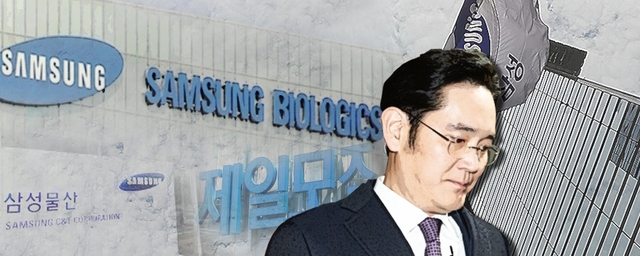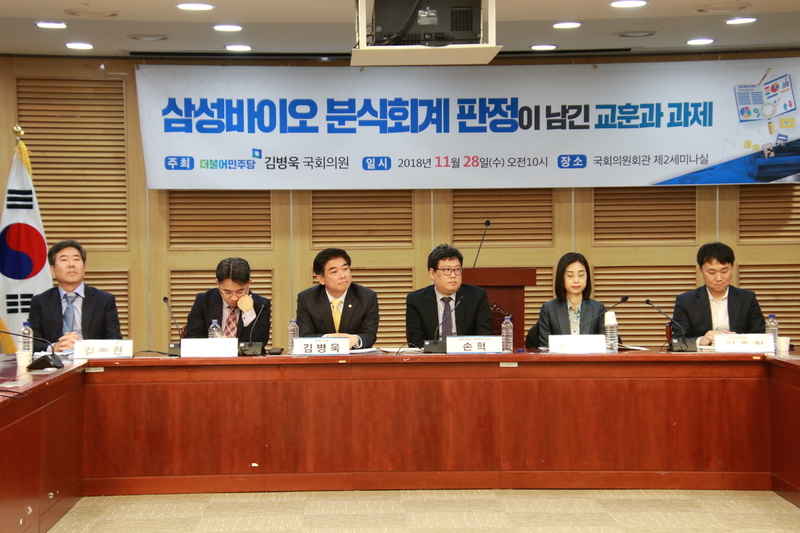Posted on : Nov.30,2018 16:04 KST
Modified on : Nov.30,2018 16:10 KST
 |
|
amsung BioLogics is currently under fire for accounting fraud.
|
Suit’s filing part of potential strategy to buy time in trial of Lee Jae-yong
Samsung BioLogics (Samsung Bio) has filed an administrative suit disputing a decision by the Financial Services Commission’s Securities and Futures Commission (SFC) of the Financial Services Commission (FSC) accusing it of “deliberate accounting fraud.” Round two of the battle now appears poised to begin in the courts as the two sides face off over allegations that Samsung Bio committed accounting irregularities amounting to some 4.5 trillion won (US$4.0 billion) through arbitrary changes to accounting standards for subsidiary Samsung Bioepis in 2015.
On Nov. 28, Samsung Bio announced that it had “filed an administrative suit with Seoul Administrative Court on Nov. 27 to contest measures in accordance with the SFC’s decision and an application to have their implementation suspended.”
The administrative suit and application concern the SFC’s administrative measures, which include 8 billion won (US$7.1 million) in penalties, financial statement revisions, recommendations to dismiss the CEO and CFO, and the designation of an auditor. The lawsuit does not extend to areas beyond administrative measures, such as an accusation with prosecutors, review for exchange delisting, or suspension of sales transactions.
In response to the suit’s filing, the FSC plans to answer Samsung Bio by appointing its own legal team consisting mainly of regulatory and legal affairs officers. The law firm of Kim & Chang is to represent Samsung Bio in the administrative case.
“The key issue in this trial is likely to be whether it is correct to view Samsung Bio as co-manager of Samsung Bioepis in accounting terms for the years 2012–2014 [as the SFC concluded],” an FSC official said.
“If that logic is disputed, the SFC’s ruling will be in jeopardy,” the official added.
 |
|
A debate on the accounting fraud of Samsung BioLogics. (provided by the office of Party lawmaker Kim Byung-wook)
|
Some are interpreting the suit’s filing as part of a strategy to buy time in the trial of Samsung Electronics Vice Chairman Lee Jae-yong. If the SFC’s decision were accepted and Samsung Bio’s financial statements revised straight away, this would raise the possibility of issues concerning the accounting of parent company Samsung C&T and the legitimacy of Lee’s acquisition of management powers – which could have a negative impact on Lee’s current trial.
Samsung Bio appears likely to focus on disputing the evidentiary value of internal documents that heavily influenced the SFC’s determination. It is also expected to gather documents for the trial to dispute the SFC’s conclusion that it had shared control over Epis with Biogen since 2012.
Discussion on Samsung Bio organized by Democratic Party lawmaker Kim Byung-wook
A discussion organized at the National Assembly by Democratic Party lawmaker Kim Byung-wook the same day on the “lessons and tasks of the Samsung Bio accounting fraud decision” offered a preview of the heated contest to come between Samsung Bio and financial authorities over key issues such as whether Samsung Epis was co-managed by Samsung Bio and joint venture Biogen.
Among the panelists, accountant Hong Soon-tak of the People’s Solidarity for Participatory Democracy economy and finance center took the position that the SFC’s conclusion was correct, while fellow accountant Kim Dong-hyeon of the law firm Bae, Kim and Lee argued that the SFC went too far with its judgment. Kim Byung-wook’s office explained that they had “gotten in touch with someone who represents a similar view to Samsung Bio’s for the discussion.”
In terms of the key issues, Kim Dong-hyeon claimed the conclusions of the Financial Supervisory Service (FSS) were inconsistent and revealed the “problems with rule-centered accounting standards.”
“Up until the initial measures, it ruled that [Samsung Bio] had sole control [over Epis as a subordinate company], but with the second measures it said it should properly be viewed as co-management [of a subsidiary company], which is a contradiction,” Kim said.
“It’s definitely true that there’s a difference between the initial and second measures,” he added.
Kim went on to say that the SFC’s conclusion “appears to have been significantly influenced by the so-called ‘smoking gun’ of the internal documents and the external variable of the parent company’s merger.”
“As a matter demanding an expert determination, the primary basis in reaching a conclusion on the appropriateness of the control framework being altered in the accounting should be whether it was handled appropriately in accordance with the International Financial Reporting Standards (IFRS),” he argued.
In response, Hong disputed the claim that the FSS’s determination had been changed.
“The FSS has consistently maintained the key position that its inspection of Samsung Bio showed 4.5 trillion won [US$4.02 billion] in profits for its 2015 accounting to be improperly earned,” he said.
“It makes no sense to argue that Samsung Bio acted on ‘discretionary authority’ in taking advantage of loopholes in accounting regulations to engage in accounting fraud,” he argued.
An accounting world source who observed the proceedings said the idea of making IFRS an issue in the accounting fraud allegations was part of Samsung Bio and Kim & Chang’s trial strategy. The source, who is familiar with the SFC discussions on the matter, explained, “The FSS’s inspection showed that the accounting firm was very aware of Samsung Bio’s intentions and assisted the company in its accounting irregularities.”
“This is not a matter for a determination on international accounting standards. It’s about a company committing deliberate accounting fraud and an accounting firm involved in criminal acts,” the source said.
By Lee Wan and Choi Hyun-june, staff reporters
Please direct comments or questions to [english@hani.co.kr]










